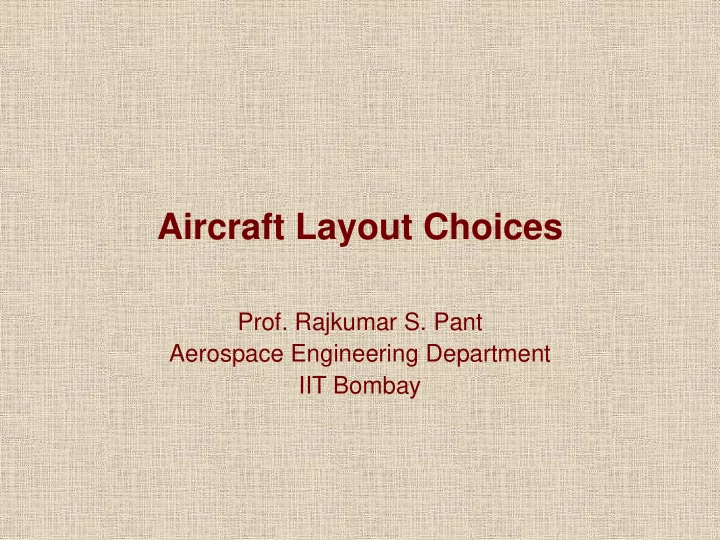

Aircraft Layout Choices Prof. Rajkumar S. Pant Aerospace Engineering Department IIT Bombay
Many letters of English Alphabet !!! TAIL PLANE LAYOUT AE-332M / 714 Aircraft Design Capsule-2
Requirements from the Tailplane Horizontal Tail Vertical Tail Trim Trim o Wing pitching moment o Engine failure o Single engine asymmetry Stability Stability o Pitching motion o Yawing motion Control o Dutch roll damping o Nosewheel liftoff Control o Low speed flight with flaps down o Engine out flight at low speeds o Transonic maneuvering o Maximum roll rate o Spin recovery
Aft Tailplane Configuration Options Conventional tail is seen in nearly 70% a/c
T-Tail Smaller vertical tail due to end- Heavier plate effect Deep stall Clear of wing and prop wash Ease in mounting of rear engines http://en.wikipedia.org/wiki/Deep_stall#Deep_stall Source: Wikipedia
T-Tail v/s Conventional Tail Advantages (of T-Tail) Disadvantages Looks Faster Pilots don’t like it o When pilots add power on a Lesser FOD from Eng. & LG single-engined aircraft, they Allow rear-mounted engines get additional control authority Bad for maintenance o Alaska MD-83's accident o http://www.ntsb.gov/publictn /2002/AAR0201.htm AE-332M / 714 Aircraft Design Capsule-2
Some aircraft with T-Tail F101-Voodoo ETA glider Canadair CRJ Piper Tomahawk
Cruciform Tail Compromise between Conventional & T-Tail JS-31, DHC-6, Falcon 20, ATR-42
Twin Tail Lower overall height Avoid fuselage wake on rudder spin resistance higher structural weight Many examples AN-225, F-15, MiG-25 http://www.atlasaerospace.net/image/f_pilotag8.jpg http://en.wikipedia.org/wiki/File:Buran_On_Antonov225.jpg http://en.wikipedia.org/wiki/File:F-15,_71st_Fighter_Squadron,_in_flight.JPG
H and Triple Tail H Tail Triple Tail undisturbed airflow on VT at lower VT to fit into hangers high AOA VT in propwash to enhance engine-out controllability Smaller HT due to endplate effect P-38 Lockheed Constellation
Butterfly or V- Tail Reduction of one tail surface Lower interference drag Lower weight Higher Complexity o Mixing unit required Beechcraft Bonanza F-117A
Other Aircraft with V Tail Eclipse 400 Cirrus Vision SF 50 Fouga CM 120 Magister RQ4/MQ4 Global Hawk AE-332M / 714 Aircraft Design Capsule-2
WING GEOMETRY AE-332M / 714 Aircraft Design Capsule-2
C 0 = root chord Wing Geometry C T = tip chord b = wing span s = wing semi-span S = wing ref. area t = thickness c = chord α = angle of attack Λ = Taper Ratio = C T /C 0 AR = Aspect Ratio = b 2 /S t/c = Thickness Ratio Source: Fielding, J. P., Introduction to Aircraft Design AE-332M / 714 Aircraft Design Capsule-2
Effect of Wing Geometry: Aerodynamics and Weight Geometrical Effecting on wing Trends Effecting on wing Range of Values polar and C L weight Parameter Airfoil Camber C L W wing ~ const C L 0 – 6 % C D α 5 - 18 % subs. Airfoil C L max W wing 3 - 7 % supers. C L Thickness ratio C D α 7 – 9 subs. Aspect Ratio C D ind W wing C L 2 – 4 supers. K C D 4 - 14 subs. Taper Ratio C Di W wing C L 2 - 5 supers. C D 0 - 35 subs. Leading-edge C D0 W wing C y C L 35 - 70 supers. sweep angle C Di C D subs. = subsonic flight supers. = supersonic flight AE-332M / 714 Aircraft Design Capsule-2
Wing Layout Parameters Reference wing planform = Trapezoidal Aspect Ratio (b 2 /s or b/c for rectangular wing) o Increase in AR Reduces induced drag Reduces stalling AOA Increases subsonic (L/D) max Increases wing weight Sweep Taper Ratio Twist Incidence Dihedral
Taper ratio λ = tip chord / root chord (root chord / tip chord in USA) λ = 1 (Rectangular wing) Heavy Ease in construction Low λ Lower wing root BM lighter wing tip stalls before root poor stalling behavior Compromise Value: usually 0.4 to 0.6
Number of Engines No clearcut indication from Accident/Emergency stats > Airlines prefer smallest number of engines Often dictated by availability 2 engines for extended over-water flights ETOPS clearance
Illustration of ETOPS D. AL T E.ALT 1 Destination ETP2 E.ALT 2 (CP) EEP Departure ETP 1 EEP : ETOPS Entry Point ETOPS Segment ETP : Equitime Point 60 minute circles E.ALT : En-route Alternate Airport Maximum diversion time circles D.ALT: Destination Alternate Unauthorised area Area of Operation AE-332M / 714 Aircraft Design Capsule-2
Choose your pick ! MANY CONFIGURATIONS AND LAYOUT POSSIBILITIES EXIST AE-332M / 714 Aircraft Design Capsule-2
Recommend
More recommend